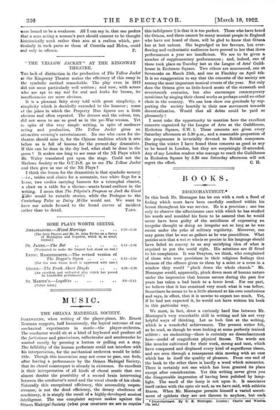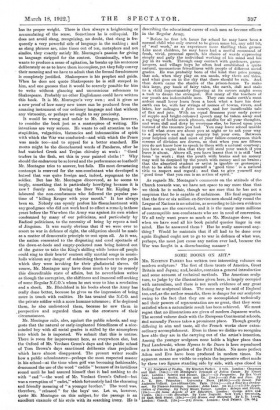BOOKS.
DISENCHANTMENT.* IN this book Mr. Montague has let out with a rush a flood of feeling which must have been carefully confined within his breast throughout his war service. He is a precisian ; one has only to observe the affectionate care with which he has studied his words and moulded his form to be assured that he would never have been guilty of the untidiness of expressing an irregular thought or doing an irregular act so long as he was sworn under the yoke of military regularity. Moreover, one may guess that he was as gallant as he was punctilious. What puzzles us is that a writer who is so precise in his language should have failed to convey to RS any satisfying idea of what is required to put the world right. His solutions are ill fitted to his complaints. It was Drayton, we think, who complained of those who were precisians in their religious feelings that because of the offence given to them by a saint or a cross in a window they would "pluck down the whole church." Mr. Montague would, apparently, pluck down most of human nature under the impression that human nature during the past few years has taken a bad lurch to a lower level. For our part, we believe that it has remained very much what it was before. Sometimes he seems to be a little alarmed at his own conclusions and says, in effect, that it is unwise to expect too much. Yet, if he had not expected it, he would not have written his book in this particular way.
We must, in fact, draw a curiously hard line between Mn Montague's very remarkable skill in writing and his not very helpful ways of thinking. Let us look first at the writing, which is a wonderful achievement. The present writer felt, as he read, as though he were looking at some perfectly trained athlete : an enchanting—there is certainly no disenchantment here—model of magnificent physical fitness. The words are like muscles cultivated for their work, strong and taut, which have conquered and displaced every kind of superfluous tissue, and are seen through a transparent skin moving with an ease which has in itself the quality of pleasure. From one end of the book to the other there is hardly a word which miscarries. There is certainly not one which has been granted its place except after consideration. Yet this writing never gives you the disagreeable impression of having been polished by lamp- light. The smell of the lamp is not upon it. It associates itself rather with the open air and, as we have said, with athletic fitness. When Mr. Montague permits himself a varied assort- ment of epithets they are not thrown in anyhow, but each
• Disenchantatont. By O. B. Montague. London: Matto and Windna, t7a. netJ
has its proper weight. There is then always a heightening or accumulating of the sense. Sometimes he is colloquial. He does not avoid slang, recognizing, no doubt, that slang is fre- quently a very powerful side of language in the making ; and as slang phrases are, nine times out of ten, metaphors and not similes, they exactly satisfy Mr. Montague's passion for giving us language stripped for the contest. Occasionally, when he wants to produce a sense of agitation, he breaks up his sentences deliberately so as to leave them incomplete, yet they fully convey their meaning and we have to admit that the formal formlessness is completely justified. Shakespeare is his prophet and guide. When he does not quote Shakespeare he is still steeped in him, and one guesses that it would be scarcely possible for him to write without glancing and unconscious references to Shakespeare. Probably no other Englishman could have written this book. It is Mr. Montague's very own ; and it gives us a new proof of how many new tones can be produced from the amazing instrument of our ordinary language and that without any virtuosity, or perhaps we ought to say preciosity.
It would be wrong and unfair to Mr. Montague, however, to consider the book just as a masterpiece of writing. His intentions are very serious. He wants to call attention to the stupidities, vulgarities, blatancies and inhumanities of spirit with which the War was conducted--and with which the Peace was made too—and to appeal for a better standard. His motto might be the disenchanted words of Pandarus, after he had watched Greek and Trojan chivalry at work : "Good traders in the flesh, set this in your painted cloths ! " Why should the endeavour be so loved and the performance so loathed? Mr. Montague tries to answer, but fails. His most devastating contempt is reserved for the non-combatant who developed a hatred that was quite foreign and, indeed, repugnant to the soldier. But has Mr. Montague discovered, as he seems to imply, something that is particularly horrifying because it is new ? Surely not. During the Boer War Mr. Kipling be- laboured the non-combatants who followed the popular pas- time of "killing Kruger with your mouth." It has always been so. Nobody can openly profess his -disenchantment with any good grace who did not work hard to effect a remedy in those years before the War when the Army was against its own wishes condemned by many of our politicians, and particularly by Radical politicians, to the necessity of being by repute a tool of Jingoism. It was surely obvious that if we were ever to resort to war in defence of right., the obligation should be made as a matter of democratic principle to rest upon all. As it was, the nation consented to the disgusting and cruel spectacle of the down-at-heels and empty-pocketed man being hoisted out of the gutter to take the King's shilling while better-off people could sing to their hearts' content silly martial songs in music- halls without any danger of submitting themselves to the perils which they were invoking for their gladiatorial slaves. Of course, Mr. Montague may have done much to try to remedy this discreditable state of affairs, but he nevertheless writes as though the corruption, the shiftiness and immoral self-seeking of some Regular N.C.O.'s whom he met were to him a revelation and a shock. Mr. Blatchford in his books about the Army has really done better, because he gives us the impression of being more in touch with realities. He has treated the N.C.O. and the private soldier with a more humane tolerance ; if he deplored them, he also understood them, because he saw them in perspective and regarded them as the creatures of their circumstances.
Mr. Montague rails, also, against the public schools, and sug- gests that the natural or early-implanted friendliness of a nice- minded boy with all social grades is stifled by the atmosphere into which he is imported. We submit that this is untrue. There is room for improvement here, as everywhere else, but the Oxford of Mr. Verdant Green's days and the public school of Tom Brown's days sanctioned deliberate class prejudices which have almost disappeared. The present writer recalls how a public schoolmaster—perhaps the most respected master in his school—at the time when golf was becoming fashionable, denounced the use of the word " caddie " because of its invidious sound until he had assured himself that it had nothing to do with "cad "—the word of Mr. Verdant Green's Oxford—but was a corruption of " cadet," which fortunately had the charming and friendly meaning of "a younger brother." The word was, therefore, " released " for the boys' use. Let us, however, quote Mr. Montague on this subject, for the passage is an excellent 'example of his style with its searching irony. He is describing the educational career of such men as become officers in the Regular Army.
"Before ho first left home for school he may have boon a normal child who only craved to be given some bit, any odd bit, of 'real work,' as an experience more thrilling than games. Like most children, he may have had a zestful command of fresh, vivid, personal speech, his choice of words expressing simply and gaily the individual working of his mind and kw joy in its work. Through easy contact with gardeners, game- keepers, and village boys ho often had established a quite natural, unconscious friendliness with people of different social grades. He was probably born of the kind that pries young, that ask, when they play on sea sands, why there are tides, and what goes on in the sky that there should be rain. And then down came the shades of the prison-house. To make this large, gay book of fairy tales, the earth, dull and stale to a child importunately fingering at its covers might seem a task to daunt the strongest. But many of the teachers of our youth are indomitable men. They can make earth's most ardent small lover learn from a book what a bore his dear earth can be, with her strings of names of towns, rivers, and lakes, her mileages d faire ntourir, and hor insufferable talc* of flax and jute. With an equal firmness your early power of supple and bright-coloured speech may be taken away and a rag-bag of feeble stock phrases, misfits for all your thoughts, and worn dull and dirty by everyone else, be forced upon you instead of the treasure you bad. You may leave school unablo to tell what stars are about you at night or to ask your way to a journey's end in any country but your own. Between your helpless mind and most of your fellow-countrymen thick screens of division are drawn, so that when you are fifteen you do not know how to speak to them with a natural courtesy; you have a vague idea that they will steal your watch if you leave it about. Above all, you have learnt that it is still bad form' to work ; that the youth with brains and no money may well be despised by the youth with money and no brains ; that the absorbed student or artist is ignoble or grotesque ; that to be able to afford yourself a good time' is a natural title to respect and regard ; and that to give yourself any good time ' that you can is an action of spirit."
As regards Mr. Montague's comments on the attitude of the Church towards war, we have not space to say more than that we think he is unfair, though we are sure that he has not a suspicion that he is capable of unfairness. His final suggestion that the five or six million ex-Service men should rally round the League of Nations is no solution, as according to his own evidence these men are the converted, and it is the many more millions of contemptible non-combatants who are in need of conversion. We all truly want peace as much as Mr. Montague does ; but when we have read all his book painful queries linger in out mind. Has he answered them ? Has he really answered any- thing ? Would he maintain that if all had to be done over again England ought not to go to war in defenca of what was, perhaps, the most just cause any nation ever had, because the War was fought in a disenchanting manner



































 Previous page
Previous page